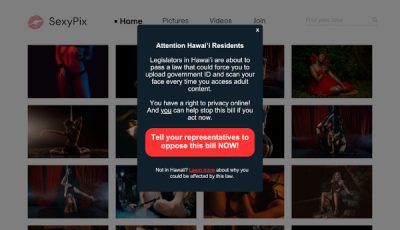ACLU Backs FSC in Challenge to Texas Age Verification Law
 WASHINGTON, D.C. – Earlier this week, the American Civil Liberties Union (ACLU), ACLU of Texas, and Quinn Emanuel filed an amicus curiae brief in support of the plaintiffs in Free Speech Coalition v. Paxton, a lawsuit challenging the constitutionality of Texas’ H.B 1181.
WASHINGTON, D.C. – Earlier this week, the American Civil Liberties Union (ACLU), ACLU of Texas, and Quinn Emanuel filed an amicus curiae brief in support of the plaintiffs in Free Speech Coalition v. Paxton, a lawsuit challenging the constitutionality of Texas’ H.B 1181.
In the brief, the amici argue the age verification provision in H.B 1181 “violates the First Amendment by improperly burdening adults’ right to access sexual content online,” as FSC noted in a statement issued earlier this week.
“Adults in America have a First Amendment right to read about sexual health, see R-rated movies, watch porn, and otherwise access information about sex if they want to,” said Vera Eidelman, staff attorney with the ACLU Speech, Privacy and Technology Project. “They should be allowed to exercise that right as they see fit, without having to worry about exposing their personal identifying information in the process.
“Rather than requiring adults to give up their privacy in order to watch and read content the government doesn’t like, legislators should focus on shaping a safer internet through things like voluntary content filters, which give control to people, not the government,” Eidelman added.
As FSC noted in their statement, Texas claims the age verification provision of the law “is about protecting minors from accessing sexual content deemed harmful to them, not regulating disfavored content, but it does not merely restrict minors’ access.”
“It also restricts adults’ access, requiring them to identify themselves online and burdening their ability to exercise their First Amendment rights to see sexual content or any other material on a regulated site,” FSC observed. “As the brief explains, requiring individuals to verify their ages before accessing this protected speech robs people of anonymity, and threatens to bar individuals—for example, those who lack government identification or whose age is misidentified by the relevant technology—from accessing certain websites altogether. Such a restriction is not necessary given the availability of other options, like content filtering, that could accomplish the government’s goal while imposing less of a burden on speech.”
FSC Executive Director Alison Boden said that while Texas’ law “may sound reasonable on its face, in practice, it is extraordinarily burdensome and invasive, effectively deterring adults from accessing legal content.”
“To make matters worse, this law – and ones like it – fail at their stated goal of protecting children online, despite forcing adult content creators and consumers to operate under the threat of surveillance and censorship,” Boden added.
In an earlier stage of the case, US District Court Judge David Ezra granted the FSC’s motion for a preliminary injunction, after finding that the law would “unconstitutionally chill the speech of adults,” as the FSC put it in their statement. Ezra was later overturned by a divided panel from the Fifth Circuit court of appeals, “reasoning that the age verification provisions’ burden on adults’ First Amendment rights merely has to have some rational basis–not face strict scrutiny–because the aim is to protect children.”
“Unless the Supreme Court issues a reversal, this decision will overturn decades of precedent protecting the free speech rights of adults,” FSC noted in its statement earlier this week.
“In prior cases brought by the ACLU, the Supreme Court has repeatedly held that requiring users to verify their age to access protected content is unconstitutional where there are less restrictive alternatives available, like filtering software,” FSC observed. “In Reno v. ACLU, the Supreme Court unanimously ruled that anti-indecency provisions of the 1996 Communications Decency Act, also meant to protect children, violated the First Amendment’s guarantee of freedom of speech in part because of the burden it imposed on adults. In Ashcroft v. ACLU, the Court held that a law almost identical to the Texas law had to satisfy strict scrutiny because it restricted adults’ access to protected sexual speech. Where a less-restrictive alternative exists—for example, the voluntary installation of filtering software on minors’ devices—the government cannot impose age verification on adults in the name of protecting children.”
You can read the ACLU’s amicus brief and the full text of the FSC statement on the FSC website.













